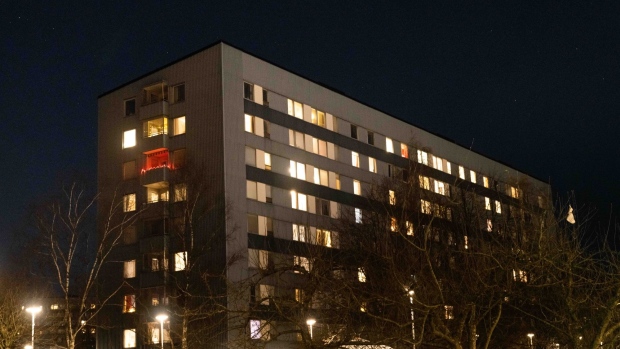Sep 4, 2022
Nordic Utilities Get €33 Billion Backstops as Power Markets Fray
, Bloomberg News

(Bloomberg) -- The governments of Sweden and Finland decided to create emergency backstops to help utilities struggling to trade on power markets gripped by unprecedented turbulence.
They’re setting up liquidity facilities made up of loans and credit guarantees, worth $33 billion in total, to avoid some power companies going into technical defaults as soon as Monday over surging collateral requirements. The aim is to prevent Russia’s energy curbs from sparking a financial crisis.
“This has, in a way, the ingredients for an energy-industry Lehman Brothers” moment, Finnish Economy Minister Mika Lintila said at a news conference in Helsinki, referring to the US investment bank whose name has become synonymous with systemic risk after its collapse set off the global financial crisis in 2008.
Earlier on Sunday, Sweden’s Finance Minister Mikael Damberg had warned that failing to act “could have contagion effects on the rest of the financial market,” even as the “issue is currently isolated to energy producers.” Sweden is home to Nasdaq Clearing AB, which sits at the heart of the Nordic power market.
Russia has been limiting supply of its gas to the European Union, contributing to a surge in prices and concerns about shortages during the colder winter months ahead. Already at four times the level of a year ago, natural-gas prices are set to jump on Monday after Russia’s announcement its Nord Stream 1 gas pipeline to Germany would stay shut. That’s piling more pressure on industries and households -- and on policy makers to act.
“This winter, Russia is preparing for a decisive energy attack on all Europeans,” Ukraine’s President Volodymyr Zelenskiy said on Saturday. “It wants to weaken and intimidate the entire Europe, every state. Where Russia cannot do it by force of conventional weapons, it does so by force of energy weapons.”
Sweden is extending as much as 250 billion kronor ($23 billion) in credit guarantees, while Finland’s program worth as much as 10 billion euros ($10 billion) includes loans and guarantees. Both countries’ parliaments are set to begin processing the motions on Monday.
Norway’s government said in a separate statement it is closely monitoring developments in the financial power market but currently sees no need for measures of its own.
“Norwegian hydropower producers have high profitability and are not known to have challenges in securing market funding,” it said.
The skyrocketing price of energy in Europe has made it more expensive for utilities to buy and sell electricity, because of the collateral required to guarantee trades. Fortum Oyj said Aug. 29 its collateral rose by 1 billion euros in a week to 5 billion euros, excluding funds posted by its German subsidiary Uniper SE.
The utility welcomed the government action, and said its discussions on liquidity support continue with the Finnish state, its majority owner.
“It’s good that the Finnish and Swedish governments seek to quickly stabilize the Nordic power markets and come to the energy companies’ aid at this difficult time,” the Espoo, Finland-based company said in a statement on Sunday.
Fortum had turned to the Finnish state for assistance to secure its liquidity needs until its hedged power contracts go to delivery and collaterals are released. Uniper, which has also sought further liquidity help, is not eligible for funds under the Finnish plan. The German company was bailed out just weeks ago after a massive shortfall in deliveries of natural gas from Russia led to huge losses.
The European Energy Exchange AG has also asked for more government support to traders to guarantee their buying and selling as billions of euros put up as collateral for trades are sapping liquidity and making prices even more volatile.
While the Finnish program has no set limits per company, the European Commission may impose such restrictions, the government said.
The Swedish guarantees will be provided by the National Debt Office, and are primarily aimed at Swedish companies, though entities based in other Nordic and Baltic countries can access them during the initial two weeks, or until their governments provide support. The move comes a week ahead of Sweden’s election, in which a constellation of conservative and liberal parties are seeking to unseat the Social Democratic minority cabinet, led by Prime Minister Magdalena Andersson.
The European Union is also preparing to step into the energy market to dampen soaring power costs. The bloc aims to limit prices in the short term and in the longer term change the way energy is priced by severing the link between gas and electricity, blunting the weapon Russia is wielding.
(Updates with comments from Norway in seventh paragraph.)
©2022 Bloomberg L.P.





